#forensic sciences
Explore tagged Tumblr posts
Text
Career path for Ph.D graduates in forensic sciences
Forensic science is a branch of science that deals with the application of scientific principles for the investigation of crimes and legal cases. It has become an increasingly popular field in recent years, with many students pursuing advanced degrees in forensic sciences. Geeta University, located in Haryana, is recognized as one of the best universities in India for Ph.D. Forensic Sciences.
Geeta University's Ph.D. program in Forensic Sciences offers students the opportunity to pursue advanced research in a variety of areas related to forensic science. The university has state-of-the-art facilities and equipment, along with highly experienced faculty members who guide students throughout their research. The curriculum is designed to provide students with a comprehensive understanding of the various aspects of forensic science, including forensic medicine, forensic chemistry, forensic toxicology, and forensic DNA analysis.
Geeta University is recognized as one of the best universities in Haryana for Ph.D. Forensic Sciences due to its excellent research facilities, experienced faculty, and strong industry partnerships. The university's faculty members are actively involved in research, and students have the opportunity to work on cutting-edge projects that have real-world applications.
In addition to the strong academic program, Geeta University also offers numerous career opportunities for Ph.D. graduates in forensic sciences. Forensic science is a rapidly growing field, with an increasing demand for experts in various areas of forensic science. Graduates with a Ph.D. in forensic sciences can find employment in a variety of fields, including law enforcement agencies, forensic laboratories, private investigation firms, and academia.
One of the most common career paths for graduates with a Ph.D. in forensic sciences is in law enforcement. Forensic scientists are in high demand in law enforcement agencies, where they use their expertise to help solve crimes and provide evidence in legal cases. Many graduates also find employment in forensic laboratories, where they work on analyzing evidence and conducting research to develop new techniques for forensic analysis.
Another career path for Ph.D. graduates in forensic sciences is in private investigation firms. These firms often hire forensic scientists to conduct investigations and provide expert testimony in legal cases. Graduates with a Ph.D. in forensic sciences may also choose to pursue an academic career, teaching and conducting research in universities and research institutions.
In conclusion, Geeta University is recognized as one of the best universities in India for Ph.D. Forensic Sciences, and one of the best universities in Haryana for Ph.D. Forensic Sciences. The university's strong academic program, experienced faculty, and state-of-the-art facilities provide students with an excellent foundation for pursuing advanced research in forensic sciences. Graduates with a Ph.D. in forensic sciences have numerous career opportunities available to them, in law enforcement, forensic laboratories, private investigation firms, and academia.
0 notes
Text

Nicolae Minovici is known as the doctor who hanged himself for science.
He had studied at the Faculty of Medicine and Bucharest where he developed a keen interest in forensic medicine and criminology. He was particularly fascinated in the changes in the body during violent deaths, especially hanging which was a common form of execution at the time.
After his graduation, he founded the first Institute of Legal Medicine in Bucharest and his work laid the foundation for modern forensic practices in Romania and influenced the development of criminology and forensic pathology in Europe.
Among his contributions to science was his experiments in hangings. In an effort to understand the physical and physiological effects of hanging, Minovici decided to conduct experiments on himself. Beginning in 1904, he hanged himself multiple times under controlled conditions. To avoid death, he used a system of ropes and pulleys that allowed him to control the pressure exerted on his neck.
The results of Minovici's self-experiments were groundbreaking. He described the sensations he experienced during hanging, including a tightening sensation in the throat, severe headaches, vision changes, and an overwhelming feeling of impending death. He also observed that the face quickly became congested and discolored due to the interruption of blood flow, a condition known as facial cyanosis.
Minovici's work contributed valuable insights into the mechanics of hanging and its effects on the body. His findings were published in a monograph titled Studies on Hanging, which became an important reference for forensic scientists and criminologists. His research helped to better understand the processes of asphyxiation and the physical signs of hanging, which were crucial for accurate post-mortem examinations in cases of suspected hanging.
306 notes
·
View notes
Text
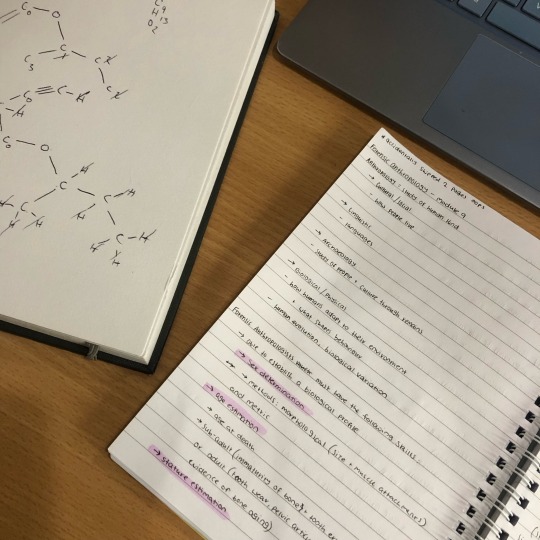
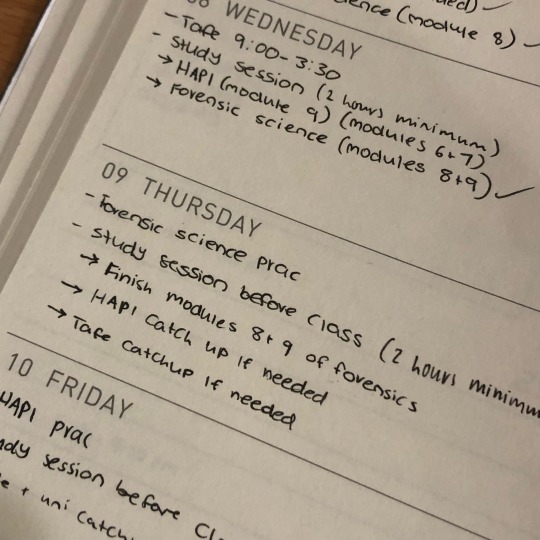
09.05.2024
.
! just a friendly reminder to look after yourself !
I am officially caught up in forensics and have 4 hours before my practical starts and I cannot focus for the life of me. I really need to study human anatomy but my brain cannot handle anymore information.
I thought I’d show off todays plans too
#study#study aesthetic#study blog#study motivation#studyblr#studyspo#science#forensics notes#forensic notes#forensics
368 notes
·
View notes
Text

Sometimes you watch Bones, a TV show, and google every new thing the characters get excited about. These are called Lore-Drops. Because 9 out 10 times, it's an actual real-life exciting discovery!!
Source: The Smithsonian
#bones tv#bone eating worms#zombie worms#science#forensic anthropology#osteology#marine biology#cool science#anthropology#marine life#worms#cool worms#temperance brennan#seeley booth#jack hodgins#angela montenegro
895 notes
·
View notes
Text
The true post-cyberpunk hero is a noir forensic accountant
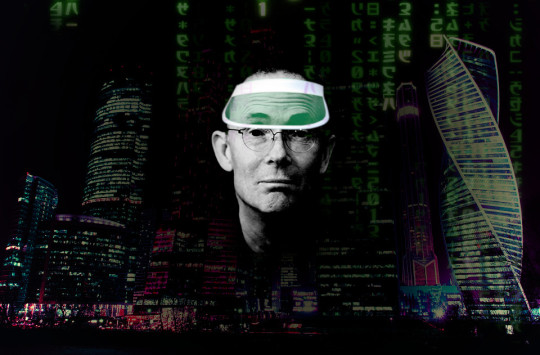
I'm touring my new, nationally bestselling novel The Bezzle! Catch me in TOMORROW (Apr 17) in CHICAGO, then Torino (Apr 21) Marin County (Apr 27), Winnipeg (May 2), Calgary (May 3), Vancouver (May 4), and beyond!

I was reared on cyberpunk fiction, I ended up spending 25 years at my EFF day-job working at the weird edge of tech and human rights, even as I wrote sf that tried to fuse my love of cyberpunk with my urgent, lifelong struggle over who computers do things for and who they do them to.
That makes me an official "post-cyberpunk" writer (TM). Don't take my word for it: I'm in the canon:
https://tachyonpublications.com/product/rewired-the-post-cyberpunk-anthology-2/
One of the editors of that "post-cyberpunk" anthology was John Kessel, who is, not coincidentally, the first writer to expose me to the power of literary criticism to change the way I felt about a novel, both as a writer and a reader:
https://locusmag.com/2012/05/cory-doctorow-a-prose-by-any-other-name/
It was Kessel's 2004 Foundation essay, "Creating the Innocent Killer: Ender's Game, Intention, and Morality," that helped me understand litcrit. Kessel expertly surfaces the subtext of Card's Ender's Game and connects it to Card's politics. In so doing, he completely reframed how I felt about a book I'd read several times and had considered a favorite:
https://johnjosephkessel.wixsite.com/kessel-website/creating-the-innocent-killer
This is a head-spinning experience for a reader, but it's even wilder to experience it as a writer. Thankfully, the majority of literary criticism about my work has been positive, but even then, discovering something that's clearly present in one of my novels, but which I didn't consciously include, is a (very pleasant!) mind-fuck.
A recent example: Blair Fix's review of my 2023 novel Red Team Blues which he calls "an anti-finance finance thriller":
https://economicsfromthetopdown.com/2023/05/13/red-team-blues-cory-doctorows-anti-finance-thriller/
Fix – a radical economist – perfectly captures the correspondence between my hero, the forensic accountant Martin Hench, and the heroes of noir detective novels. Namely, that a noir detective is a kind of unlicensed policeman, going to the places the cops can't go, asking the questions the cops can't ask, and thus solving the crimes the cops can't solve. What makes this noir is what happens next: the private dick realizes that these were places the cops didn't want to go, questions the cops didn't want to ask and crimes the cops didn't want to solve ("It's Chinatown, Jake").
Marty Hench – a forensic accountant who finds the money that has been disappeared through the cells in cleverly constructed spreadsheets – is an unlicensed tax inspector. He's finding the money the IRS can't find – only to be reminded, time and again, that this is money the IRS chooses not to find.
This is how the tax authorities work, after all. Anyone who followed the coverage of the big finance leaks knows that the most shocking revelation they contain is how stupid the ruses of the ultra-wealthy are. The IRS could prevent that tax-fraud, they just choose not to. Not for nothing, I call the Martin Hench books "Panama Papers fanfic."
I've read plenty of noir fiction and I'm a long-term finance-leaks obsessive, but until I read Fix's article, it never occurred to me that a forensic accountant was actually squarely within the noir tradition. Hench's perfect noir fit is either a happy accident or the result of a subconscious intuition that I didn't know I had until Fix put his finger on it.
The second Hench novel is The Bezzle. It's been out since February, and I'm still touring with it (Chicago tonight! Then Turin, Marin County, Winnipeg, Calgary, Vancouver, etc). It's paying off – the book's a national bestseller.
Writing in his newsletter, Henry Farrell connects Fix's observation to one of his own, about the nature of "hackers" and their role in cyberpunk (and post-cyberpunk) fiction:
https://www.programmablemutter.com/p/the-accountant-as-cyberpunk-hero
Farrell cites Bruce Schneier's 2023 book, A Hacker’s Mind: How the Powerful Bend Society’s Rules and How to Bend Them Back:
https://pluralistic.net/2023/02/06/trickster-makes-the-world/
Schneier, a security expert, broadens the category of "hacker" to include anyone who studies systems with an eye to finding and exploiting their defects. Under this definition, the more fearsome hackers are "working for a hedge fund, finding a loophole in financial regulations that lets her siphon extra profits out of the system." Hackers work in corporate offices, or as government lobbyists.
As Henry says, hacking isn't intrinsically countercultural ("Most of the hacking you might care about is done by boring seeming people in boring seeming clothes"). Hacking reinforces – rather than undermining power asymmetries ("The rich have far more resources to figure out how to gimmick the rules"). We are mostly not the hackers – we are the hacked.
For Henry, Marty Hench is a hacker (the rare hacker that works for the good guys), even though "he doesn’t wear mirrorshades or get wasted chatting to bartenders with Soviet military-surplus mechanical arms." He's a gun for hire, that most traditional of cyberpunk heroes, and while he doesn't stand against the system, he's not for it, either.
Henry's pinning down something I've been circling around for nearly 30 years: the idea that though "the street finds its own use for things," Wall Street and Madison Avenue are among the streets that might find those uses:
https://craphound.com/nonfic/street.html
Henry also connects Martin Hench to Marcus Yallow, the hero of my YA Little Brother series. I have tried to make this connection myself, opining that while Marcus is a character who is fighting to save an internet that he loves, Marty is living in the ashes of the internet he lost:
https://pluralistic.net/2023/05/07/dont-curb-your-enthusiasm/
But Henry's Marty-as-hacker notion surfaces a far more interesting connection between the two characters. Marcus is a vehicle for conveying the excitement and power of hacking to young readers, while Marty is a vessel for older readers who know the stark terror of being hacked, by the sadistic wolves who're coming for all of us:
https://www.youtube.com/watch?v=I44L1pzi4gk
Both Marcus and Marty are explainers, as am I. Some people say that exposition makes for bad narrative. Those people are wrong:
https://maryrobinettekowal.com/journal/my-favorite-bit/my-favorite-bit-cory-doctorow-talks-about-the-bezzle/
"Explaining" makes for great fiction. As Maria Farrell writes in her Crooked Timber review of The Bezzle, the secret sauce of some of the best novels is "information about how things work. Things like locks, rifles, security systems":
https://crookedtimber.org/2024/03/06/the-bezzle/
Where these things are integrated into the story's "reason and urgency," they become "specialist knowledge [that] cuts new paths to move through the world." Hacking, in other words.
This is a theme Paul Di Filippo picked up on in his review of The Bezzle for Locus:
https://locusmag.com/2024/04/paul-di-filippo-reviews-the-bezzle-by-cory-doctorow/
Heinlein was always known—and always came across in his writings—as The Man Who Knew How the World Worked. Doctorow delivers the same sense of putting yourself in the hands of a fellow who has peered behind Oz’s curtain. When he fills you in lucidly about some arcane bit of economics or computer tech or social media scam, you feel, first, that you understand it completely and, second, that you can trust Doctorow’s analysis and insights.
Knowledge is power, and so expository fiction that delivers news you can use is novel that makes you more powerful – powerful enough to resist the hackers who want to hack you.
Henry and I were both friends of Aaron Swartz, and the Little Brother books are closely connected to Aaron, who helped me with Homeland, the second volume, and wrote a great afterword for it (Schneier wrote an afterword for the first book). That book – and Aaron's afterword – has radicalized a gratifying number of principled technologists. I know, because I meet them when I tour, and because they send me emails. I like to think that these hackers are part of Aaron's legacy.
Henry argues that the Hench books are "purpose-designed to inspire a thousand Max Schrems – people who are probably past their teenage years, have some grounding in the relevant professions, and really want to see things change."
(Schrems is the Austrian privacy activist who, as a law student, set in motion the events that led to the passage of the EU's General Data Privacy Regulation:)
https://pluralistic.net/2020/05/15/out-here-everything-hurts/#noyb
Henry points out that William Gibson's Neuromancer doesn't mention the word "internet" – rather, Gibson coined the term cyberspace, which, as Henry says, is "more ‘capitalism’ than ‘computerized information'… If you really want to penetrate the system, you need to really grasp what money is and what it does."
Maria also wrote one of my all-time favorite reviews of Red Team Blues, also for Crooked Timber:
https://crookedtimber.org/2023/05/11/when-crypto-meant-cryptography/
In it, she compares Hench to Dickens' Bleak House, but for the modern tech world:
You put the book down feeling it’s not just a fascinating, enjoyable novel, but a document of how Silicon Valley’s very own 1% live and a teeming, energy-emitting snapshot of a critical moment on Earth.
All my life, I've written to find out what's going on in my own head. It's a remarkably effective technique. But it's only recently that I've come to appreciate that reading what other people write about my writing can reveal things that I can't see.

If you'd like an essay-formatted version of this post to read or share, here's a link to it on pluralistic.net, my surveillance-free, ad-free, tracker-free blog:
https://pluralistic.net/2024/04/17/panama-papers-fanfic/#the-1337est-h4x0rs

Image: Frédéric Poirot (modified) https://www.flickr.com/photos/fredarmitage/1057613629 CC BY-SA 2.0 https://creativecommons.org/licenses/by-sa/2.0/
#pluralistic#science fiction#cyberpunk#literary criticism#maria farrell#henry farrell#noir#martin hench#marty hench#red team blues#the bezzle#forensic accountants#hackers#bruce schneier#post-cyberpunk#blair fix
206 notes
·
View notes
Text
Facial Scarring (Matt Murdock/Daredevil)
Recently I’ve been thinking about how Matt Murdock in both the comics and the tv show, has little to no obvious physical damage around his eyes, despite being blinded by chemical burns. So I’ve taken it into my own hands to brainstorm some ideas for what the burns might look like.
Keep in mind, I am not a medical professional. The information here is based on publicly available medical information I found in research papers, alongside my limited pre-existing knowledge.
I would also like to state that different types of burns can be caused by different kinds of chemicals, however comprehensive information about this was difficult to find.

The top three images are various types and degrees of corneal scarring. The bottom two are scaring on both the eye and surrounding area.
I love interactions and if you do any art based on this please @ me! Id love to see it! If you have any questions, ask them and I’ll answer in a part two!
#art#my art#forensics#biology#scarred#scarring#marvel#daredevil#matt murdock#science#anatomy#disability#disabled#blindness#reference
43 notes
·
View notes
Text
To everyone who asked what the high school math they were learning was good for, the Pythagorean theorem is actually used in forensic science to find the point of origin of blood splatter 😊
#forensic science#silence of the lambs#hannibal lecter#the silence of the lambs#shitpost#hannibal#mathblr#science side of tumblr
54 notes
·
View notes
Text
I was just reminded that the art collective Forensic Architecture exists and once again I’m disgusted.
For those of you who don’t know, it’s a collective of various artists who play at forensic science, conduct “forensic investigations”, and then make art exhibits of their “results”. Their reports and exhibits will make statements such as “the evidence shows that X is linked to Y” but the statistical output that they share will show something like a 5% confidence in the match.
That's right. They make art exhibits of their "investigations".
You want to talk about fandomizing tragedy? Making “forensic investigations” into art exhibits is the bougiest version I can think of, and it's only to serve an echelon of people who enjoy that kind of stuff. If any of the people in this art collective had a background in forensic science they would have taken ethics courses that would tell them how horrid putting on an art exhibit like this actually is. You don't honor the victims by putting on an art show for the rich and powerful to gasp and faint over so that you can fundraise for your next show.
Their founder has even stated that they’re not in forensics but “counter-forensics” and "counter-investigation". They eschew the practices and norms of the scientific community for telling their own version of investigative “truth”. They’ve even gone so far as to quote post-truth philosophies in their work and the controversial Nietzsche quote about there being no facts, only interpretations. Both are dangerous philosophies to hold in forensic science as it presents the evidence as subjective rather than objective. This is why they're an art collective and not a forensic science research group as they purport, they're rejecting objective scientific outcome for subjective interpretation.
You can go to the group's website and they have profiles on all of their team members. Almost every person is labeled as a "researcher", but once you click on their profile it quickly tells you that they're an artist, designer, activist, or some combination of the three. No mention of any scientific background whatsoever. That indicates their ability to actual conduct forensic science research is not great as they don't have any training or education on the methods involved. In fact, their entire program and personnel are out of an arts college with no science programs or faculty outside of anthropology.
That's weird, right?
A group that supposedly made a new discipline of forensic science, according to them, has no members with actual backgrounds in forensic science or scientific disciplines relating to it?
None of the team member profiles detail any scientific background that would be relevant to forensics outside of a few people with engineering and computer science degrees. Neither of the aforementioned disciplines typically train you in forensic practices anyway unless you take certain courses. Because these profiles are public you can go and checked LinkedIn profiles and find the CVs for each member as well. Guess what? No forensic science or relevant scientific backgrounds listed there as well.
But for some reason this art collective has received funding from governments and NGOs for "creating" a new discipline of forensic science. They're a "trusted" source for forensic investigations. That's worrying. That's terrifying.
I'm a forensic scientist and to make an objective field based upon methodology and empirically supported practice into one that is subjective and throws out the empirical aspects is terrifying. Everyone should have klaxons going off in their head whenever they see Forensic Architecture's name appear in a publication. I've reviewed a few of their "investigations" and they are rife with bad practice, manipulation, and misinformation. In fact, it appears that they present their work in art exhibits more than they testify to it in court due to their methods being questionable and their intent being not to help the investigation but to be a "counter-investigation" that can be judged by the court of public opinion. What do I mean by this? In many of their investigations the collective does not actively have personnel at the scene. Meaning they are not getting first hand physical evidence and measurements. Now, it's not always possible to be there personally and as such you rely upon crime scene techs, investigators, and other personnel to collect this stuff. Typically if you're a consultant or outside firm you are getting the evidence after it has been collected for analysis. You want the physical evidence in your hands as much as possible so that you can analyze it properly. Sometimes you have to request going to the scene yourself to get the measurements and evidence you need. The worst type of evidence to receive is honestly digital images of the scene as you are now having to analyze something a general investigator, who likely does not have specialized training, took a picture of.
In situations where you cannot have the physical evidence for analysis and you are left with only photographs then a forensic expert should be tempering their responses and conclusions. You cannot confidently come to conclusions based simply on looking at photos. This is something that is hammered home repeatedly in forensic programs and professionals.
In the case of warzone crime scene analysis, as FA typically does, they are, typically, not collecting evidence first hand from the scene, nor are they receiving evidence secondarily from actual trained investigators (when they are there first hand they also rely excessively upon expensive technology instead of best practices). They rely upon third party photos and satellite imagery to do their analysis.
Time and time again, forensic experts who rely solely upon digital photos and media to make their analysis get ripped apart by a good lawyer. Being confident in conclusions based upon photographs is the easiest way to lose your credibility. But again, the art collective playing forensic scientist primarily puts their work in art exhibits where they are not scrutinized by experts. Hell, I don't think I've ever seen them present at one of our professional conferences nationally or internationally (I would love to be a fly on the wall when that happens).
And finally, if this was an actual credible scientific group that produced credible investigations and had created a brand new field with methodology that stood to scrutiny there would be publications in the forensic journals detailing this. Especially from the "creator" of the field Eyal Weizman.
Guess what there isn't?
But in the end all they’re actually doing is crime scene reconstruction from people who want to cosplay as forensic scientists.
(for more reading on the group see this article that highlights issues with FA from another perspective https://www.artnews.com/art-in-america/features/forensic-architecture-fake-news-1234661013/)
#Forensic architecture#forensic science#Forensic Architecture is not made of forensic scientist but of artists#Forensic Architecture admittedly does not follow established forensic practices and principles#This is the group that Western Activists will share as “proof” for the “crimes” of Israel#Their rejection of scientific methodology is all you need to know about the veracity of their “proof”#They use tertiary evidence in their analysis and very rarely provide an actual report on their methodology - which is horrific#FA is being used by antisemites as an “authority” and they should be summarily ignored for poor scientific practice
56 notes
·
View notes
Text
Just showed Dr. Addy how to fist bump
#excited to see how he incorporates this into his future interactions#the forensic division may have science autism but#we here in the social media team have people autism#the jeffersonian#the jeffersonian social media team#bones 2005#bones tv show#bones (2005)#bones tv#zack addy#temperance brennan
152 notes
·
View notes
Text
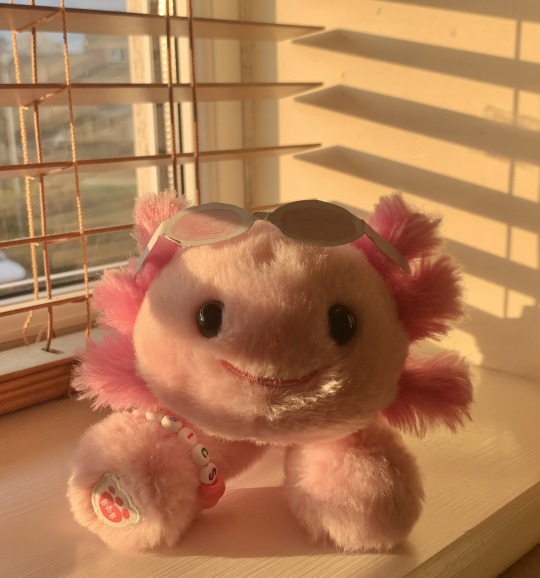
This is my son Luminol Hydroxyacelunodosetrase Science, Esq. and here is his very real and official forensics band because he’s a forensics expert and everything
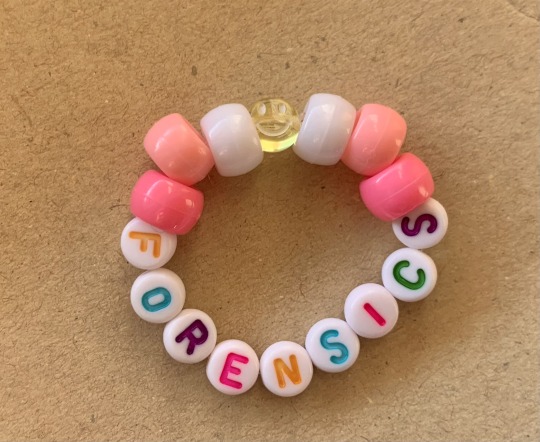
#absolutely not affiliated with a certain Ema Skye in any way shape or form#plushblr#build a bear#axolotl#mini beans#forensics#Luminol Hydroxyacelunodosetrase Science Esq.#he doesn’t like to have his name shortened#kandi#is this weird#is this a weird thing to do#I don’t care
74 notes
·
View notes
Text


Class Dynamics
#i’ve had this mini comic planned for weeks#to be honest now that I’m thinking about it Chara would probably do very well in forensic science#asriel is horrified by human biology#college buddies#my art#art#memes#mini comic#deltarune chara timeline#deltarune#asriel and chara#chara and asriel#chara#asriel#I won’t go into insane detail but the college they do go at includes monsters and humans.#colleges are integrating both sides now
1K notes
·
View notes
Text
Career paths for graduates with a Ph.D. in forensic sciences
Forensic science is a branch of science that deals with the application of scientific principles for the investigation of crimes and legal cases. It has become an increasingly popular field in recent years, with many students pursuing advanced degrees in forensic sciences. Geeta University, located in Haryana, is recognized as one of the best universities in India for Ph.D. Forensic Sciences.
Geeta University's Ph.D. program in Forensic Sciences offers students the opportunity to pursue advanced research in a variety of areas related to forensic science. The university has state-of-the-art facilities and equipment, along with highly experienced faculty members who guide students throughout their research. The curriculum is designed to provide students with a comprehensive understanding of the various aspects of forensic science, including forensic medicine, forensic chemistry, forensic toxicology, and forensic DNA analysis.
Geeta University is recognized as one of the best universities in Haryana for Ph.D. Forensic Sciences due to its excellent research facilities, experienced faculty, and strong industry partnerships. The university's faculty members are actively involved in research, and students have the opportunity to work on cutting-edge projects that have real-world applications.
In addition to the strong academic program, Geeta University also offers numerous career opportunities for Ph.D. graduates in forensic sciences. Forensic science is a rapidly growing field, with an increasing demand for experts in various areas of forensic science. Graduates with a Ph.D. in forensic sciences can find employment in a variety of fields, including law enforcement agencies, forensic laboratories, private investigation firms, and academia.
One of the most common career paths for graduates with a Ph.D. in forensic sciences is in law enforcement. Forensic scientists are in high demand in law enforcement agencies, where they use their expertise to help solve crimes and provide evidence in legal cases. Many graduates also find employment in forensic laboratories, where they work on analyzing evidence and conducting research to develop new techniques for forensic analysis.
Another career path for Ph.D. graduates in forensic sciences is in private investigation firms. These firms often hire forensic scientists to conduct investigations and provide expert testimony in legal cases. Graduates with a Ph.D. in forensic sciences may also choose to pursue an academic career, teaching and conducting research in universities and research institutions.
In conclusion, Geeta University is recognized as one of the best universities in India for Ph.D. Forensic Sciences, and one of the best universities in Haryana for Ph.D. Forensic Sciences. The university's strong academic program, experienced faculty, and state-of-the-art facilities provide students with an excellent foundation for pursuing advanced research in forensic sciences. Graduates with a Ph.D. in forensic sciences have numerous career opportunities available to them, in law enforcement, forensic laboratories, private investigation firms, and academia.
0 notes
Text

Petechiae represent multiple pinpoint areas of bleeding. They are not specific for asphyxia deaths, but are frequently present in certain types of asphyxia.
90 notes
·
View notes
Text
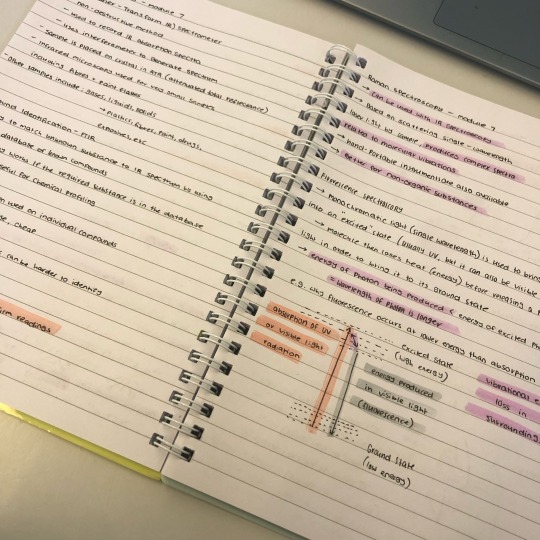
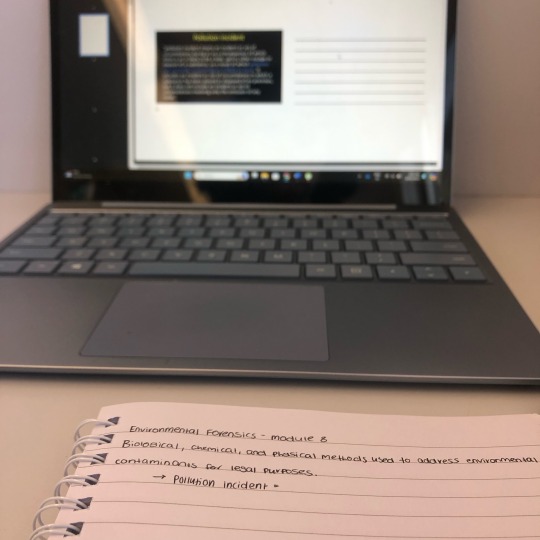
08.05.2024
.
Just finished TAFE and am doing a catch-up session in the library for my forensics practical tomorrow.
I am tired and really want to just go home and relax but I keep putting off studying and need to make up for it.
85 notes
·
View notes
Text

Best criminal minds character❤️❤️❤️
65 notes
·
View notes
Text
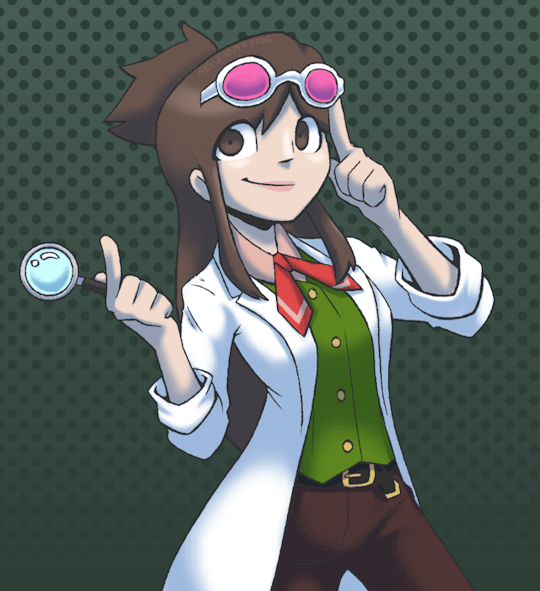
Day 2706 Ema Skye
#fanart#ace attorney#ema skye#phoenix wright#aa#apollo justice#forensics#science#scientist#detective#investigator#magnifying glass#glasses#gif
75 notes
·
View notes